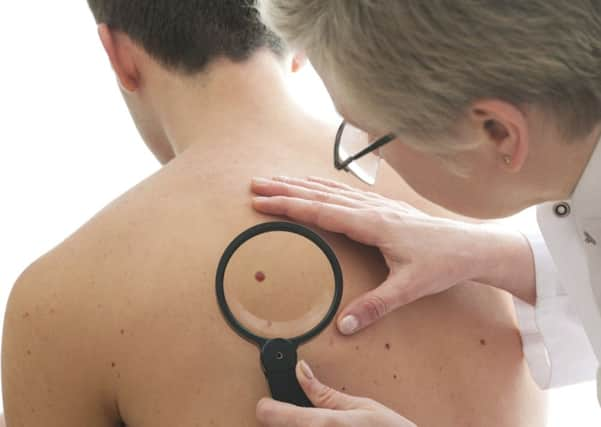Scots scientists: skin cancer spreads via ‘trail’


Scottish scientists have discovered the melanoma cells give off a so-called “green light” before they start to follow a “breadcrumb trail” of fatty molecules.
The researchers said that although their work was in its early stages, it represented an “exciting discovery” which might eventually help doctors make sure the cancer is not allowed to spread.
Advertisement
Hide AdAdvertisement
Hide AdA leading Scottish melanoma charity described the research as having potentially “huge benefits” to preventing the spread of a type of cancer particularly prevalent among young people.
The findings show that the cancerous cells emit a signal which triggers them to spread around the body after a naturally occurring molecule, lysophosphatidic acid (LPA).
Tests showed the cells start their journey by breaking down a nearby source of the fatty chemical and, once it is depleted, they go on the move in search of more. This creates a trail leading to the bloodstream and on to a new site in the body.
The team from the Cancer Research UK Beatson Institute in Glasgow filmed the cells and found that they spread around the body at a pace of around a millimetre per day and can arrive anywhere in the body within a few weeks.
Lead scientist Professor Robert Insall said: “Our exciting findings show that skin cancer cells create their own ‘green light’ signal to start spreading, and are lured to travel around the body by a trail of fatty molecules.
“The next step will be to find how the melanoma cells break down the LPA molecules to see if this sparks ideas for new ways to stop the cancer from spreading. At the moment, our research is still in early stages but we hope this could help doctors to make sure this cancer doesn’t spread.”
Leigh Smith, the chair of Melanoma Action and Support Scotland, said: “Preventing the spread of skin cancer would be a major achievement as it’s the spread that causes fatalities. Once it’s inside your body, you don’t know what it’s doing until you have it picked up at an outpatient clinic.
“While treating melanoma on the skin is relatively simple, once it’s spread it can be fatal. Stopping the spread would be of huge benefit.”
Advertisement
Hide AdAdvertisement
Hide AdIt comes as health officials are facing a mounting challenge in urging Scots to give up sunbeds and take precautions in hot weather amid rising skin cancer rates.
Statistics published earlier this year showed that rates of the disease have risen by more than a third in the past decade. In 2012, 1,117 cases of malignant melanoma were reported in Scotland.
More than 13,000 people are diagnosed with melanoma every year in the UK and around 2,200 people die from the disease, according to Cancer Research UK.
The charity said there are few options available for patients whose melanoma has spread.
Its chief scientist, Professor Nic Jones, welcomed the research, published yesterday in the journal, PLOS Biology.
He said: “Research like this is crucial to find effective ways to limit the spread of tumours and increase the chances for more successful treatment.”
Anyone with concerns about skin cancer is urged to contact MASSCOT on 07738 231 260 or www.masscot.org.uk.